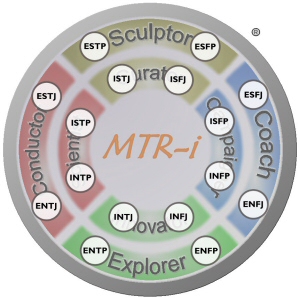The Myers-Briggs Type Indicator® is a widely used psychometric personality test that, when used appropriately, can help individuals choose the right career path. Lots of college students in the freshman and sophomore years are still trying to figure out what they want to do with their lives — its a very common dilemma. For students who feel like round pegs trying to fit themselves into square holes, taking the Myers-Briggs test — if you haven’t already — might be an excellent idea. This test won’t be like an exam — no cramming necessary. There are no wrong answers. All you have to do is choose the answers that fit best with who you think you are, and this test will (hopefully) help you to figure out who you might become.
However, people often misunderstand the purpose of the MBTI®. While the test is a useful tool for individuals who are exploring different careers, it does not match personality types with specific occupations. Instead, the test provides an individual with a better understanding of his strengths and preferences so that he can choose a career that he would enjoy.
About MBTI®
The MBTI® assigns one of 16 distinct personality types to each individual based on his preferences for interacting with the world. To take the test, individuals must indicate their preference in four different areas:
Favorite World. Test takers who prefer to focus on their own inner world choose introversion (I), while those focused on the outer world choose extraversion (E).
Information. Individuals who prefer to interpret the meaning of information they receive choose intuition (N), while those who focus on the basics choose sensing (S).
Decisions. Subjects who prefer to look at the circumstances surrounding a decision choose feeling (F), while subjects who make decisions logically choose thinking (T).
Structure. People who like to keep their options open choose perceiving (P), while those who like to have things decided in advance choose judging (J).
After answering these questions, an individual can express his personality type with a four-letter code that uses one letter from each category. For example, a person who chooses introversion, sensing, feeling and judging has the personality type ISFJ.
Choosing a Career
No one particular personality type is superior to any other. Likewise, no particular personality type is better suited for a specific occupation than any other. All careers require a variable skill set, and an individual can use his strengths to excel in any career. Below are some examples of how various personality types can be used in the same career.
Construction manager. An individual with a construction management degree will spend his days in a leadership position. Though some personality types may enjoy this career more than others, it is a suitable career for more than one personality type. For example, an individual with personality type ENTP can use extraversion and intuition to inspire subordinates, while an individual with personality type ESTP will offer fair, logical leadership and structure to his team.
Scientist. An individual with personality type INTP is ideally suited for a career as a scientist. This individual is able to think logically, focus on small details and use intuition to develop new theories. However, an individual with personality type ISTP can also enjoy a career in science. This individual can use his strict analytical skills to solve scientific problems and analyze the validity of any claim.
Artist. Initially, it may seem like an individual with personality type ENFP would make the best artist. This person is open to new ideas, intuitive and enjoys operating in his external world. However, the opposite personality type, ISTJ, can also find success in this career. This person is able to analyze even the smallest details and recreate them with complete accuracy.
Though all types of personalities can use their strengths to succeed in virtually any career, individuals with a certain personality type may prefer some careers to others. By determining their own MBTI® type, individuals can identify the careers they would enjoy most.
 Thomas Doane-Swanson is a green tech blogger, an armchair scientist, an English major, an aspiring permaculture practitioner, a TED Talk addict and a frequent contributor at Eco Wonder. Follow him on twitter @thomas_swanson.
Thomas Doane-Swanson is a green tech blogger, an armchair scientist, an English major, an aspiring permaculture practitioner, a TED Talk addict and a frequent contributor at Eco Wonder. Follow him on twitter @thomas_swanson.


